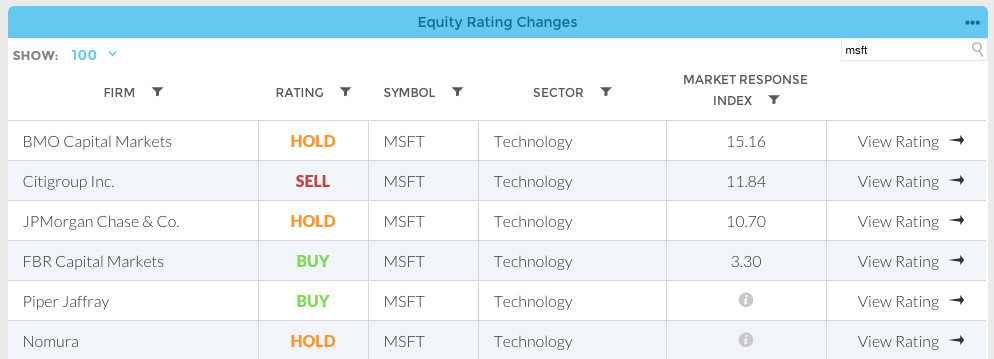
Microsoft released its earnings yesterday, and the results were mixed. On one hand, the company had strong revenue, but on the other hand, operating income was down a bit from the previous year. Surface is now a billion-dollar product while the Xbox division's margins slipped because of price cuts, which leaves analysts trying to figure out if Microsoft is doomed for the short term or is a more logical long term play for the Redmond-based company.
As with nearly every time a company release its earnings, investment entities provide their opinion about what you should do with a firms stock – in this case, Microsoft's.
This morning, six firms issued equity ratings for Microsoft, and there is not a strong pattern to them that signals confidence for or against the Windows developer. JPMorgan Chase & Co. dropped its rating from buy to hold, CitiGroup issued a downgrade from neutral to sell, Nomura downgraded from buy to neutral, BMO Capital Markets issued a new rating of hold, FBR Capital Markets issued a new rating to buy, and finally, Piper Jaffray issued a buy rating as well.

These are large firms who disagree about the future of Microsoft, and of course, it also depends on your view of the market. For the short term, it does look like Microsoft revenue will slow, per their guidance, but also, long term with Azure and other platforms is looking bright in terms of revenue.
The last time Microsoft issued its earnings, it received three buy ratings – from Oppenheimer, Credit Suisse and FBR Capital Markets. That confidence vote by those firms drove Microsoft's stock price up, but with six firms issue mixed ratings, Microsoft's stock is down considerably today.
While the strategy is still unknown about how Microsoft will secure future revenues as Windows cash-flow slows, at least it is not sharing the plans publicly; the company has proven it can still home-grow billion-dollar lines of business.
With positive momentum around Windows 10 and its new hardware line, Hololens, the long-term play for Microsoft would appear to be strong but for investors, the only thing that matters is when cash hits the bank accounts.
Disclosure: Brad Sams is the co-Founder of Tracour.com that provided the equity data for this post; this post does not consist of nor should it be interpreted as financial advice.

















57 Comments - Add comment